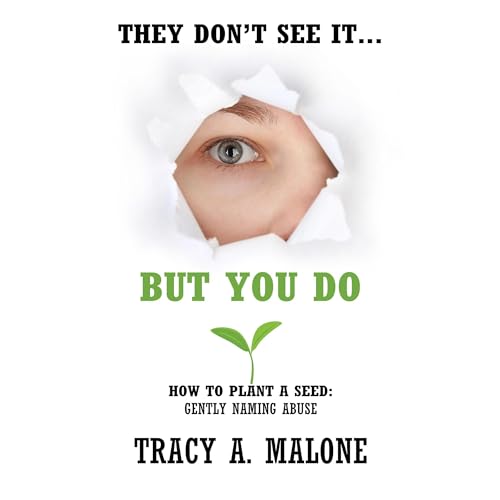
They Don't See It... but You Do
How to Plant a Seed: Gently Naming Abuse
No se pudo agregar al carrito
Solo puedes tener X títulos en el carrito para realizar el pago.
Add to Cart failed.
Por favor prueba de nuevo más tarde
Error al Agregar a Lista de Deseos.
Por favor prueba de nuevo más tarde
Error al eliminar de la lista de deseos.
Por favor prueba de nuevo más tarde
Error al añadir a tu biblioteca
Por favor intenta de nuevo
Error al seguir el podcast
Intenta nuevamente
Error al dejar de seguir el podcast
Intenta nuevamente
 Exclusivo para miembros Prime: ¿Nuevo en Audible? Obtén 2 audiolibros gratis con tu prueba.
Exclusivo para miembros Prime: ¿Nuevo en Audible? Obtén 2 audiolibros gratis con tu prueba.
Elige 1 audiolibro al mes de nuestra inigualable colección.
Acceso ilimitado a nuestro catálogo de más de 150,000 audiolibros y podcasts.
Accede a ofertas y descuentos exclusivos.
Premium Plus se renueva automáticamente por $14.95 al mes después de 30 días. Cancela en cualquier momento.
Compra ahora por $9.99
-
Narrado por:
-
Virtual Voice
-
De:
-
Tracy Malone

Este título utiliza narración de voz virtual
Voz Virtual es una narración generada por computadora para audiolibros..
“What do I say when they don’t see the red flags?”
“How do I talk to them without pushing them away?”
If you’ve ever asked these questions, you’re not alone. Talking about abuse is never easy and it’s often filled with emotional landmines. The wrong approach, even with the best intentions, can unintentionally push them closer to the abuser instead of opening their eyes.
When someone you love shares confusing, painful, or abusive experiences, your instincts scream to protect them. But rushing in with warnings or labels can backfire, triggering shame, denial, or even deeper entanglement with the abuser.
They Don’t See It… But You Do is a compassionate, practical guide for friends, parents, siblings, and loved ones who see someone they care about being manipulated, isolated, or emotionally abused but don’t know how to bring it up without pushing them away.
Real-World Red Flags You May Hear:
- “He tracks my location to make sure I’m safe.”
- “I feel like I can’t do anything right.”
- “My spouse says I’m a bad parent.”
- “We don’t talk to my family anymore it’s better that way.”
- “I make the money, but I’m not allowed to spend any of it.”
- “I feel like I’m failing all the time.”
- “She gets mad when I want time to myself or with friends.”
In This Book, You’ll Learn:
- Why people in toxic relationships often can’t see the abuse
- How to spot the signs of narcissistic abuse, gaslighting, coercive control, and emotional manipulation
- What not to say and how to avoid triggering defensiveness or shame
- When to speak up, and when to step back
- Over 50 “seed starter” conversation prompts for different situations
- How to respond when they defend the abuser or minimize the harm
- How to stay present and grounded without sacrificing your own emotional well-being
You don’t have to label their relationship.
You just have to be the steady voice they remember when the fog begins to lift.
They Don’t See It… But You Do is your roadmap for planting seeds of awareness with empathy, patience, and the power of gentle truth.
Las personas que vieron esto también vieron:

Todavía no hay opiniones


